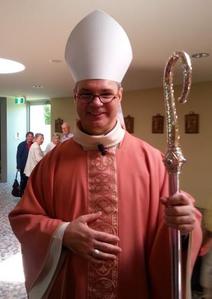The first one, for want of a better name, I have dubbed 'elder technology'. The rest of them will be in later blog-posts.
This is the situation:
My parish has the most extraordinary cohort of parishioners well into their retirement years in their late 70s, 80s and 90s. They are faithful, they are holy, they are truly inspirational, and they all fret about the spiritual health of their descendants and pray for them. However the vast majority of them are not connected to any form of social media, and because of this they are feeling disconnected to the lives of their children and especially their grandchildren who are using social media.
I bet that your parish is not dissimilar to mine.
Now who are the most likely people to use social media for what I call 'soft evangelisation' – 'liking' or 'sharing' an image, article or video-clip that reminds people of the goodness of God? The holy grandparent or holy great grandparent, of course! But only if they learn how to use social media.
Obviously the families of these elder parishioners are frustrated silly that they can't send them a text or post a family picture that they will get to see. So many of them have thought, 'Aha I'll get them a smart phone / iPad for Christmas!'
So holy granny and wise grandpa open these Christmas gifts and say, 'Thank you, that's very nice dear' and promptly put them away in a cupboard because the family lives too far away to help them learn how to use these devices.
Wouldn't it be wonderful – as a parish - if each January we could set aside some time for our holy elder folk to meet with our tech-savvy younger folk and learn how to use these devices? In particular I am thinking about the youngsters who will be the right age to attend the next World Youth Day.
What a great way for our holy elder folk to get to know our young people and vice versa. Because they are part of the same parish, the young people are not far away if something goes wrong with the technology. And let's face it, it is so easy to press the wrong button and get ourselves in a technological mess.
Even better if after each learning session it is expected that the holy elder will pray out loud for the needs of the young person, and the young person will pray out loud for the needs of the holy elder – even if it is only a sentence long.
Can you see that this would be a win-win solution? The different generations would get to know each other better and appreciate each other more. Our holy elder folk can start sending gentle reminders of God through social media to family and friends. And when it comes time for our young people to ask for financial help to get them off to World Youth Day, the response of the holy elder folk will be extraordinary.


 RSS Feed
RSS Feed